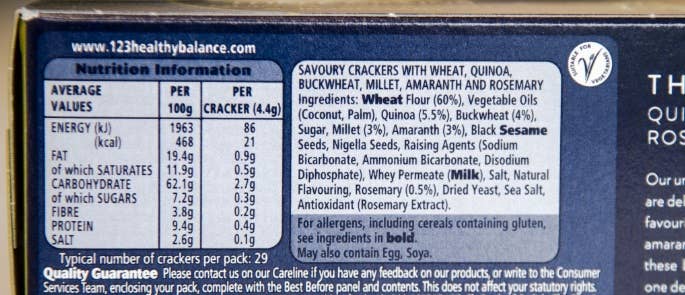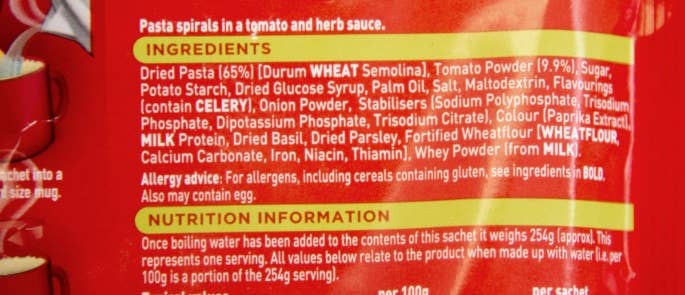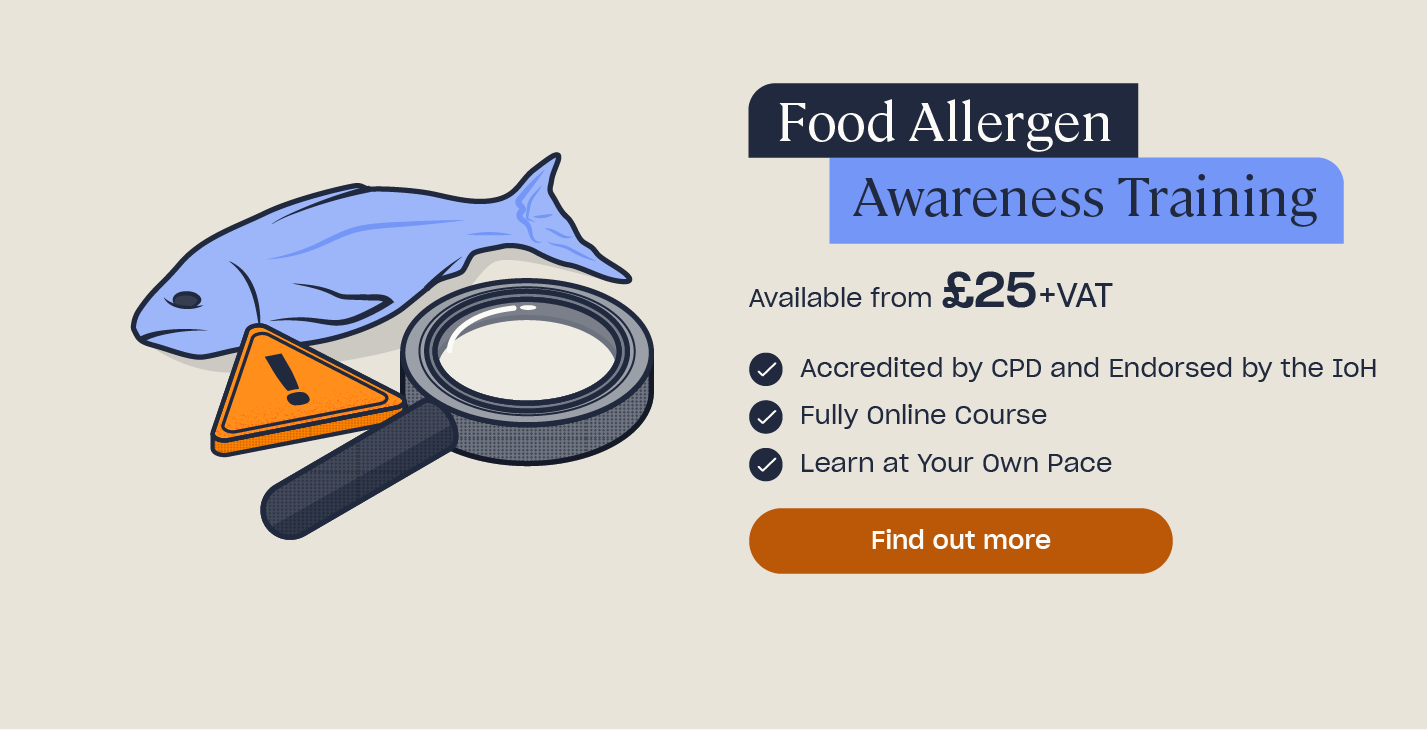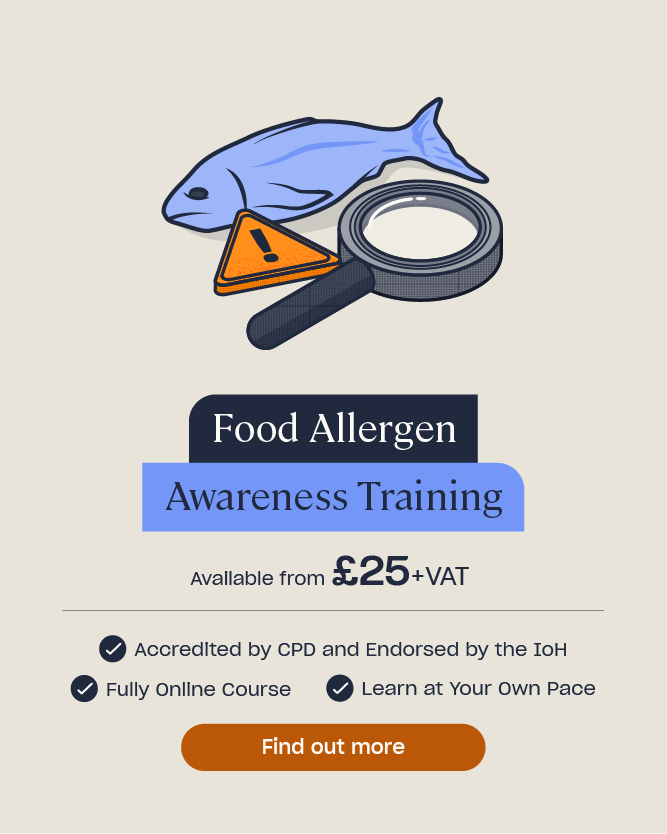Food Allergies: Myth Vs. Fact
A food allergy is where the body’s immune system, which exists to defend the body from infection, mistakenly recognises harmless foods as a threat. When this happens, chemicals are released in the body and cause the symptoms of an allergic reaction. An allergic reaction can vary massively in severity, from a mild rash to anaphylaxis and even death.
Food allergies are very dangerous and they must be taken seriously. However, how much do we know about food allergies, the myths that surround them, and the truth behind them?
Food Allergy Myths
According to the FSA, there are an estimated 2 million people living with a diagnosed food allergy in the UK. However, whilst this statistic is high and food allergies are clearly very common, food allergies are still not clearly understood by everyone. This article expels some common food allergy myths and explains the facts behind them.
Food Allergy Myth 1
‘There are only 14 things you can be allergic to.’
The Fact:
There are 14 named allergens which include foods such as milk, soy, fish, peanuts, and gluten. However, you can be allergic to any food, and the 14 named ones are just the most common. Under food safety law, these 14 allergens must be labelled as being present in foods. For example, packaged food must contain a list of the ingredients and highlight any present allergens in bold. This is because these are the most common, but you can still be allergic to any other food.

Food Allergy Myth 2
‘A food allergy and a food intolerance are the same thing.’
The Fact:
A food intolerance is not the same as a food allergy. An intolerance is a difficulty digesting certain foods and having an unpleasant physical reaction to them, like a stomach ache. A food allergy, by contrast, is a chemical reaction that involves the immune system. A food intolerance does not involve the immune system.
Additionally, a person with a food intolerance may be able to eat a small amount of the food and be fine, and only have unpleasant symptoms when they eat too much. For those who have a food allergy, even a small amount of an allergen can cause a fatal reaction.
Food Allergy Myth 3
‘Eating a small amount of an allergen won’t be enough to cause harm.’
The Fact:
This myth is completely untrue and it’s very dangerous to assume this. For somebody with a food allergy, eating even 1/1000th of a gram of an allergen can be enough to cause an allergic reaction, as can touching the food. Additionally, using the same equipment to prepare a gluten free sandwich as you have to prepare a regular sandwich, for example, would be very dangerous for someone who has Coeliac Disease. For this reason, it’s essential that those who prepare food ensure there is no allergenic contamination and that they declare any allergens that may be present in the food.

Food Allergy Myth 4
‘You can only get a food allergy as a child.’
The Fact:
Most food allergies do begin in infancy and childhood, but that doesn’t mean they can only begin in these years. You can develop a food allergy at any age. Furthermore, you can suddenly develop an allergy to a food that you’ve eaten your whole life and never had a problem with.
Food Allergy Myth 5
‘Peanut is the most dangerous food allergy.’
The Fact:
Peanuts are the most common food allergen and the most likely to cause an allergic reaction, but this doesn’t mean they are the most dangerous. There is no hierarchy for the level of threat from an allergen. If somebody who is allergic to a certain food consumes that food, then they could have a dangerous reaction, no matter what that food is.
Peanuts are one of the ‘big 8′ allergens, alongside foods like milk, soy, and cereals containing gluten. These 8 allergens account for the most common food allergies, not how dangerous they are. All allergies are dangerous, even if they are not as common.

Food Allergy Myth 6
‘You can reverse an allergy by cutting down on the food you’re allergic to.’
The Fact:
Food allergies are not a medical condition that you can ‘reverse’ and especially not by cutting down on the product that causes the reaction. Consuming even a small amount of an allergen is very dangerous for someone who has an allergy. These people need to completely cut the allergen from their diet to remain safe, not just cut down on consumption.
Need a Course?
Our Food Allergen Awareness Training is designed to help food handlers recognise how to label allergens correctly and provide customers with accurate allergen information.
Food Allergy Myth 7
‘Food additives and artificial flavours cause most allergic reactions.’
The Fact:
This is a common myth with no truth behind it. In fact, it is natural foods that make up the ‘big 8′ allergens that account for the majority of allergic reactions, such as fish, crustaceans, and tree nuts.

Food Allergy Myth 8
‘Allergic reactions get worse and more severe every time you have one.’
The Fact:
Allergic reactions are unpredictable and completely variable. How the body reacts to an allergen can be different every time it comes into contact with it. There is no way of knowing when a reaction will be mild, moderate, or severe.
A range of things can affect the severity of a reaction, such as underlying conditions (e.g. if the person has asthma), how quickly an allergen is absorbed, and how it was consumed (e.g. if it was raw or cooked).
Food Allergy Myth 9
‘An allergic reaction always happens immediately after eating an allergen.’
The Fact:
An allergic reaction can occur immediately after eating an allergen but it can also be delayed. For example, a reaction may not occur until after a food has been digested. The typical window for an allergic reaction to occur is from minutes of contact with the allergen up to two hours. However, it can be longer in certain instances and it is impossible to predict.
Food Allergy Myth 10
‘You don’t need to carry an adrenaline injector with you unless you’re eating.’
The Fact:
Anybody who has a severe food allergy should carry an adrenaline auto-injector, such as an EpiPen, with them at all times. Even if someone with a food allergy doesn’t plan on eating, they should still carry the pen with them for various reasons. Not all allergic reactions happen straight away and it could be life-threatening if one hits when somebody is without their adrenaline shot. Additionally, they may come into contact with an allergen without eating one, such as touching a surface that has traces of the allergen on it. It is therefore very risky for someone who has a severe allergy to be without their adrenaline injector.
Food allergies are very dangerous and potentially life-threatening. Knowing the truth behind some of the most common food allergy myths can help to keep people safe and make life easier for people who suffer.
What to Read Next:
- Food Labelling Regulations Guide
- Managing Allergies in the Workplace
- Food Allergy Awareness Quiz
- Allergen Awareness Online Training











